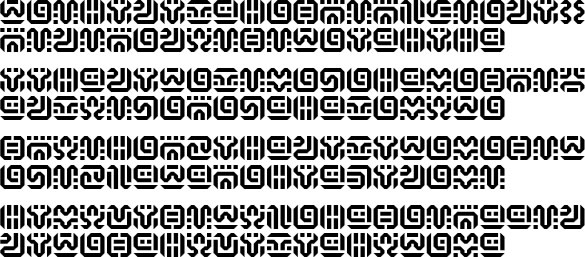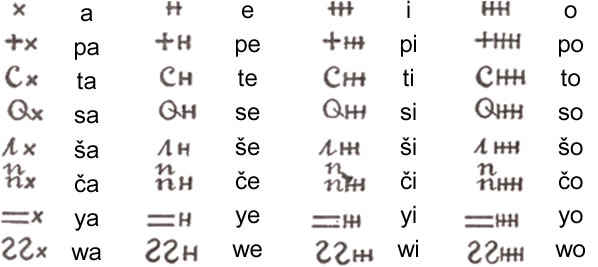Podcast: Play in new window | Download
Here’s the latest news from the world of Omniglot.
There are new language pages about:
- Nahavaq (Lhiimaqalhqamaꞌ), a Southern Oceanic spoken on Malekula Island in Malampa Province of Vanuatu.
- Noakhailla (নোয়াখাইল্লা), an eastern Indo-Aryan language spoken mainly in the southeast of Bangladesh, and also in the northeast of India
- Mamasa, a South Sulawesi language spoken in West Sulawesi Province in central Indonesia.
New constructed script: Terraphon, which is an alternative way to write American English devised by Earthcat Terrence.

New numbers pages:
- Nahavaq (Lhiimaqalhqamaꞌ), a Southern Oceanic spoken on Malekula Island in Malampa Province of Vanuatu.
- Zaghawa (Beria), an Eastern Saharan language spoken mainly in parts of Chad and Sudan.
- Istriot (Lèngua Eîstriota), a Romance language spoken in the south west of the Istrian Peninsula in Croatia
On the Omniglot blog there’s a new post called Hiding in Caves in which we find out what links the word grotesque with caves and hiding., and there’s the usual Language Quiz. See if you can guess what language this is:
Here’s a clue: this language is spoken in the Philippines.
The mystery language in last week’s language quiz was Limbu (ᤕᤠᤰᤌᤢᤱ ᤐᤠᤴ), a Kiranti language spoken in eastern Nepal and northeastern India.
There’s a new Celtiadur post about the words companion, ceilidh and related things in Celtic languages, and I made improvements to posts about words for https://www.omniglot.com/celtiadur/2020/03/22/badgers/Badgers, and Circles.
In the Celtic Pathways podcast we investigate the possible Celtic origins of the word Phon(e)y and find out how it is connect to words for ring and related things.
I also made improvements to the Zaghawa, Uzbek, Karakalpak, Uyghur, Kazakh and Tatar language pages.
For more Omniglot News see:
https://www.omniglot.com/news/
https://twitter.com/Omniglossia
https://www.facebook.com/groups/omniglot/
https://www.facebook.com/Omniglot-100430558332117
You can also listen to this podcast on: Apple Podcasts, Amazon Music, Stitcher, TuneIn, Podchaser, PlayerFM or podtail.
If you would like to support this podcast, you can make a donation via PayPal or Patreon, or contribute to Omniglot in other ways.
Radio Omniglot podcasts are brought to you in association with Blubrry Podcast Hosting, a great place to host your podcasts. Get your first month free with the promo code omniglot.








